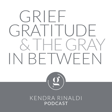
Miscarriage: Our Story of Hope and Heartbreak with Andrea Turnbow
Andrea Turnbow Andrea Turnbow is the founder of The Grief Nook (formerly Autumn Winds Coaching) and is a Certified Grief Educator and Trauma and Resilience Life Coach. After experiencing a miscarriage during her first pregnancy, she set out to become the grief support provider that she and her husband needed at that difficult time. After the tragic loss of her grandfather and other life-altering losses over the years, she was guided further down the path of grief work to help normalize the grief process, and lessen the stigma around topics that are considered taboo. She guides anyone who has been impacted by pregnancy loss, loss of a loved one, or life-altering loss through their unique grief journeys.
@andreathegriefcoach: https://www.instagram.com/andreathegriefcoach/
@thegriefnook: https://www.instagram.com/thegriefnook/
Website: https://www.thegriefnook.com/
Email: andrea@thegriefnook.com
Contact Kendra Rinaldi for coaching or to be a guest on the podcast:griefgratitudepodcast@gmail.com https://www.griefgratitudeandthegrayinbetween.com/
Zencastr 30% off code https://zen.ai/54gDe-jaFwTSG8vlp8a3tw
Key Takeaways:
· Autumn’s Impact: The loss of Autumn, Andrea’s child, ignited her passion to validate others’ grief, particularly those experiencing early pregnancy loss.
· Turning Point: In 2022, Andrea faced her grandpa’s passing. This pivotal moment led her to reevaluate her career and embrace her calling to support others.
· Hospice Experience: Being with her grandpa during his final days in the hospital and hospice profoundly affected Andrea. It motivated her to advocate for those who lack a support system during grief.
· No Expectations: Grieving doesn’t follow a timeline. Andrea emphasizes that everyone processes loss differently, and there’s no rush to reach a specific point.
· Validation and Connection: Seeking validation and connecting with others are essential for healing.


